|
|
|
Sort Order |
|
|
|
Items / Page
|
|
|
|
|
|
|
| Srl | Item |
| 1 |
ID:
171230
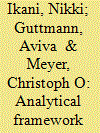

|
|
|
|
|
| Summary/Abstract |
This paper develops a novel theoretical framework for the conduct of postmortems after major foreign policy surprises for the European Union and its member states. It proposes a taxonomy of surprise which elucidates how officials or organisations experience both sudden and slower-burning threats. It argues that foreign policy surprises in European settings require a closer look at who was surprised, in what way, and when. The paper outlines six vital performance criteria and three key attenuating factors, allowing us to better ground judgements about foreign policy performance as well as to advance realistic recommendations on how to improve.
|
|
|
|
|
|
|
|
|
|
|
|
|
|
|
|
| 2 |
ID:
137146


|
|
|
|
|
| Summary/Abstract |
More than a decade after the European Court of Justice’s “open skies” judgments, is the European Union (EU) now capable of asserting a leading role in the international aviation regime? This article approaches the EU’s external aviation policy through the lenses of role theory and, more precisely, through the threefold connotation of the concept of role: role conceptions, role expectations, and role performance. It finds that there is a converging tendency between the three dimensions and that the gap between external expectations and actual policy behaviour on the one hand, and the EU’s aspiration for a leading role in international aviation on the other, is diminishing. Over time, then, the EU could indeed transform from a regional trendsetter into a leading player in the international aviation regime.
|
|
|
|
|
|
|
|
|
|
|
|
|
|
|
|
| 3 |
ID:
116684
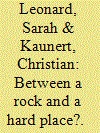

|
|
|
|
|
| Publication |
2012.
|
| Summary/Abstract |
This article focuses on the financial sanctions adopted by the European Union (EU) against individuals suspected of involvement in terrorist activities. This sanctions regime has been sharply criticised for its negative impact on human rights and has seen several judicial challenges before the European Courts. In contrast with most of the existing literature, which focuses on legal issues or examines the consequences of the EU financial sanctions, this article takes a step back to examine the reasons for which the EU decided to adopt these controversial financial sanctions in the first place. This article argues that it is mainly its commitment to 'UN-centred effective multilateralism' that has led the EU to adopt these financial sanctions measures in order to align itself with the UN financial sanctions regime. However, the Kadi landmark ruling of the European Court of Justice (ECJ) has challenged the pre-eminence of multilateralism over other considerations, such as the respect for human rights. As the Court of Justice prepares to hand down its second judgment in this case, the EU is left torn between its commitment to multilateralism and its commitment to human rights, which can be fully reconciled only if the UN sanctions regime meets the EU's human rights standards.
|
|
|
|
|
|
|
|
|
|
|
|
|
|
|
|
| 4 |
ID:
122826
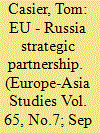

|
|
|
|
|
| Publication |
2013.
|
| Summary/Abstract |
Russia-EU relations have often been presented in terms of a normative gap, with the EU appearing as a normative and Russia as a non-normative actor. This article critically analyses this 'normative argument' which sees this gap as the cause of tensions. Pleading for a less dichotomous approach to norms and interests, it challenges the normative argument on the basis of the assumed congruence between the norm-driven input and norm-promoting output of European foreign policy. As an alternative, the article explores how the normative agenda in Eastern Europe serves instrumental purposes. Selective norm promotion has the potential to change the hierarchy of identities among post-Soviet states.
|
|
|
|
|
|
|
|
|
|
|
|
|
|
|
|
| 5 |
ID:
168966
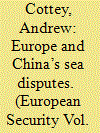

|
|
|
|
|
| Summary/Abstract |
China’s disputes with its South East Asian neighbours and Japan in the South and East China Seas have emerged as important tests of the implications of China’s rise, posing dilemmas not just for regional states but also for other global actors, including European states and the European Union (EU). European responses to these disputes have pulled in three directions: a normative approach emphasising the resolution of disputes within the framework of international law; a power balancing approach, led by France and the United Kingdom, involving support for freedom of navigation operations and strengthened bilateral and EU ties with other Asian states; and de facto acquiescence to Chinese advances in the region. In terms of understanding EU foreign policy, this case suggests a sequence: a normative approach as the initial default EU policy; a turn to power balancing when the effectiveness of that policy is called into question, but also the possibility of acquiescence and consequent divisions amongst EU member states. Europe faces dilemmas in balancing support for the United States, Japan and the South-East Asian states with its strategic partnership with China, but in practice European policy is much closer to that of the former group than that of Beijing.
|
|
|
|
|
|
|
|
|
|
|
|
|
|
|
|
| 6 |
ID:
118006
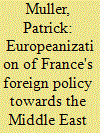

|
|
|
|
|
| Publication |
2013.
|
| Summary/Abstract |
France's prominent role in Europe's policy towards the Arab-Israeli conflict represents an interesting case study for the evolving research on Europeanization. While France's involvement in the CFSP is frequently described as a case of national projection through the EU, this view needs qualification. Proposing a novel conceptual categorization of different member state approaches to European foreign policy cooperation, this article shows that France's involvement in Europe's Middle East policy has gone through different phases. Guided by de Gaulle's politique arabe, France assumed a 'leadership' role in Europe's common foreign policy, leaving a strong mark on its collective diplomacy. Since the 1990s, however, a number of complementary changes have weakened France's capacity for leadership, challenging well-established French foreign policy positions. France's response to the mounting constraints of EU-level cooperation has oscillated between 're-nationalization' and efforts to 'facilitate' a common European approach, displaying a considerable degree of pragmatism and tactical adaptation.
|
|
|
|
|
|
|
|
|
|
|
|
|
|
|
|
| 7 |
ID:
080304
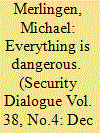

|
|
|
|
|
| Publication |
2007.
|
| Summary/Abstract |
The article builds on the existing critique of `Normative Power Europe' (NPE), extending it in previously unexplored directions by drawing on the work of Michel Foucault. The author conceptualizes and empirically demonstrates the hidden face of European Union (EU) norm diffusion. The EU promotes human agency abroad through the promotion of fundamental civil, political and economic rights. This is the celebrated face of European foreign policy. Its other face - ignored by students of NPE (proponents and critics alike) - is that the EU's self-styled mission for humanity inscribes the very agency of those it seeks to empower in relations characterized by epistemic violence, the technologization of politics and administrative arbitrariness. The author delimits a conceptual space for investigating the two faces of NPE, making the case for a micropolitical analysis of EU norm diffusion. In two empirical snapshots, the article brings into focus the deep ambiguity of the EU's post-sovereign normative power.
|
|
|
|
|
|
|
|
|
|
|
|
|
|
|
|
| 8 |
ID:
094597
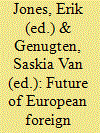

|
|
|
|
|
| Publication |
London, Routledge, 2009.
|
| Description |
199p.
|
| Standard Number |
9780415478717
|
|
|
|
|
|
|
|
|
|
|
|
Copies: C:1/I:0,R:0,Q:0
Circulation
| Accession# | Call# | Current Location | Status | Policy | Location |
| 054852 | 327.4/JON 054852 | Main | On Shelf | General | |
|
|
|
|
| 9 |
ID:
174569
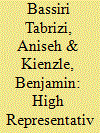

|
|
|
|
|
| Summary/Abstract |
The negotiations with Iran about its nuclear programme have seen the most protracted involvement of the High Representatives of the European Union in a high-profile policy case. This article traces the evolution of the High Representatives’ participation in the negotiations, from the first contacts with the E3 (Germany, France and the United Kingdom) in 2003 to the adoption of the Joint Comprehensive Plan of Action in 2015. It focuses on the institutional role the High Representatives played in relation with the directoires leading the talks with Iran – first the E3 and, since 2006, E3/EU. In this context, it examines the personal and organisational factors that affected the influence each of the three High Representatives (Javier Solana, Catherine Ashton and Federica Mogherini) had in regard to the directoires. The analysis distinguishes specifically between the phases before and after the 2009 Lisbon Treaty. The article shows how similar personal qualities of the three High Representatives in terms of problem-solving and trust-building gave them political capital that enabled them to adopt a fairly constant role as bridge-builders within the directoires and between the directoires and other actors. The reforms of the Lisbon Treaty had only a minor impact.
|
|
|
|
|
|
|
|
|
|
|
|
|
|
|
|
| 10 |
ID:
164503


|
|
|
|
|
| Summary/Abstract |
The European Union (EU) is an imperial power. Building on the EU-as-empire paradigm and Manners’ concept of ‘normative power’, this article argues that owing to the institutional set-up of its governance and its discursive strategies, the Union resembles an imperial polity which has to adopt an interest- and norm-driven ‘dual strategy’. EU scholarship has been exploring the tensions between short-term security interests and a long-term reformist agenda in the Union’s external strategies for the last two decades. The argument presented in this article is novel as it is informed by findings from a new imperial historiography which has revisited the imperial governance and discourse of former European empires—for example the Habsburg, Ottoman and Russian empires. The first part develops a definition of the EU as a liberal empire based on strategies of geopolitical modelling of hierarchy in centre-periphery relations and normative discourses to legitimise that hierarchical order. The second part explores the impact of strategic environments on EU strategy. An analysis of the ENP reviews of 2011 and 2015 suggests a resilience of the EU’s ‘dual strategy’ despite a geopolitical turn in strategic thinking. Thus, the supranational identity building capabilities of the EU’s ‘normative power’ are retained. At the same time, its impact propensity in the neighbourhood appears significantly weakened.
|
|
|
|
|
|
|
|
|
|
|
|
|
|
|
|
| 11 |
ID:
138869


|
|
|
|
|
| Summary/Abstract |
The growth of European Union (EU) competences in the field of external security in the last decade has produced a substantial increase in the number of EU institutions and bureaucratic actors engaged in the planning and management of these policies. Moreover, the expansion of competences in such a sovereign sensitive area comes up against the persistent tergovernmental nature of the security sector. This has resulted, on the one hand, in a complex institutional architecture with heavy demands in terms of coordination, and on the other hand, in a stark differentiation and stratification of the legal regimes with a potential to impact on policy outcomes. This state of uncertainty is particularly relevant when looking at relations with countries bordering the Union, as the long-standing web of interactions there has developed a more complex institutional environment. While most of the scholarly literature focuses on single institutional sectors or policies (Common Security and Defence Policy, European Neighbourhood Policy, or the external side of the Area of Freedom, Security and Justice), this study seeks to address the issue with a comprehensive analysis of the institutional framework that has emerged in the last decade, more notably, since the entry into force of the Treaty of Lisbon. The article provides, first, an overview of the EU’s institutional actors responsible for security policies in the regions bordering the EU, and second, an examination of the different mechanisms established to address the coordination issue. Finally, this study will argue that the traditional military dimension is but one, and certainly not the most developed, of the security instruments employed by the EU. At another level, it will be argued that the shift of focus from the military to other security tools has altered the institutional balance in the security sector, substantially adding to the relative influential weight of the Commission.
|
|
|
|
|
|
|
|
|
|
|
|
|
|
|
|
| 12 |
ID:
159969


|
|
|
|
|
| Summary/Abstract |
Eurocentrism in the analysis of European foreign policy often renders scholars blind to other world views and realities, although engaging with these may be critical for understanding the relevance and impact of this policy in other parts of the world. Notwithstanding calls for decentring the study of International Relations and European foreign policy in particular, scholars of European foreign policy generally lack the tools and conceptual lenses to overcome Eurocentrism in their analyses. This article proposes an analytical framework to systematically open up for difference, and to see and understand dynamics and realities that go beyond dominant Eurocentric accounts, while trying to avoid the pitfalls of simplification and knowledge fragmentation. The framework consists of six partially overlapping decentring categories – spatial, temporal, normative, polity, linguistic, and disciplinary decentring – and is developed through two dimensions of the Decentring Agenda proposed by Fisher Onar and Nicolaïdis: ‘provincialising’ (questioning Eurocentric perspectives) and ‘engagement’ (learning from other perspectives). In this way, this article aims to support scholars of European foreign policy in overcoming Eurocentrism and in operationalising the Decentring Agenda.
|
|
|
|
|
|
|
|
|
|
|
|
|
|
|
|
| 13 |
ID:
174566


|
|
|
|
|
| Summary/Abstract |
The Lisbon Treaty recently celebrated its 10th anniversary. The 2009 legal text was an attempt to enhance the unity, consistency and effectiveness of the EU’s action in an increasingly volatile world. And yet, the post-Lisbon time period has been characterised by multiple crises coming from the West, the East, the South, and even from within the EU. Against this backdrop, our Special Issue makes a systematic assessment of the EU's foreign policy post-Lisbon and of its evolution by focusing on the role of the High Representative of the Union for Foreign Affairs and Security Policy (HR/VP). Assessing the post-Lisbon HR/VPs provides important insights on EU foreign policy processes over the past decade. In this introduction, we discuss the three research questions that guide our collection of articles, as well as our theoretical and empirical contribution to existing scholarly literature.
|
|
|
|
|
|
|
|
|
|
|
|
|
|
|
|
| 14 |
ID:
142420


|
|
|
|
|
| Summary/Abstract |
This article examines Austria's position as a small, neutral state in the international society as framed by the English School. This examination is chiefly done in the face of the effects of great power conflicts and their impact on Western Europe's society of states. In doing so, the article provides insights to the fundamental puzzles concerning the ways power is managed between states, great and small alike. The article surveys how war (such as in South Ossetia in 2008) and war-like incidents affected Austria's position in the international society and the understanding of its place in great power conflicts between East and West. I argue that neutrality, despite European integration in the context of a peaceful international society, remains a political option for small states such as Austria. This option is especially lively if there is a domestic sentimental attachment to it and sticking to it does not undermine domestic or European and international foreign policy rationale and interests.
|
|
|
|
|
|
|
|
|
|
|
|
|
|
|
|
| 15 |
ID:
171156
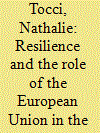

|
|
|
|
|
| Summary/Abstract |
The idea of resilience in EU academia and practice predates the EU Global Strategy. But it is with the 2016 EUGS that resilience was elevated into one of the five guiding principles for the EU’s role in the world. This article recounts the origins of the concept in the context of European foreign policy. Resilience reflected the implicit goal of the EUGS to foster a more joined-up approach to European foreign policy, it epitomized the philosophy of principled pragmatism enshrined in the EUGS, and it captured the transformative approach to complex change advocated by the EU. The implementation of the EUGS over the last three years has been a story of lights and shadows. However, the idea of resilience lives on also and perhaps even more importantly because of its changing interpretation in the European policy debate.
|
|
|
|
|
|
|
|
|
|
|
|
|
|
|
|
| 16 |
ID:
151387
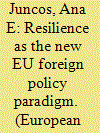

|
|
|
|
|
| Summary/Abstract |
This article examines the rise of resilience discourses in EU foreign policy. The European Union Global Strategy (EUGS) refers to building state and societal resilience in its neighbourhood as one of the key strategic priorities of the EU. This article argues that the discourse of resilience that permeates the EUGS chimes well with a pragmatist turn in social sciences and global governance. The EUGS introduces resilience-building alongside an emphasis on flexibility, tailor-made approaches and the need for local ownership, capacity-building and comprehensiveness. More importantly, the new EUGS proposes “principled pragmatism” as a new operating principle in its foreign policy. While this might suggest a more pragmatic EU foreign policy, a closer examination of the EUGS discourse reveals significant tensions between a pragmatic and a principled foreign policy, which undermine the added value of resilience-building as a new foreign policy paradigm.
|
|
|
|
|
|
|
|
|
|
|
|
|
|
|
|
| 17 |
ID:
174567
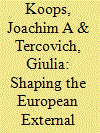

|
|
|
|
|
| Summary/Abstract |
This article assesses the role, influence and core aspects of the EU High Representatives’ (HR/VPs) “political leadership” in the context of their efforts to advance the institutionalisation of the EEAS and its crisis management structures in the post-Lisbon era. By combining analytical lenses from the literature on “European political leadership”, foreign policy analysis (FPA) and political psychology with insights from a wide range of semi-structured interviews and primary sources, the article analyses how the leadership approaches of Catherine Ashton and Federica Mogherini were influenced by core aspects, such as institutional setting, situational factors and “personal qualities”. By examining how both HR/VPs and their chosen advisors sought to shape the EU’s EEAS and crisis management institutions, scholars can gain important insights about how “personal qualities” and prior foreign policy experience can influence the HR/VPs strategic choices and their impact within and across the EEAS. Finally, the article considers the differing effects between “maverick” and “orthodox” leadership and approaches and concludes that whilst outside perspectives can bring fresh ideas and institutional innovations, they will fail to be of lasting significance and permanence if not accompanied by sufficient support from the dominant foreign and security policy conventions.
|
|
|
|
|
|
|
|
|
|
|
|
|
|
|
|
| 18 |
ID:
126856
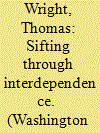

|
|
|
| 19 |
ID:
147927


|
|
|
|
|
| Summary/Abstract |
Amid the UK’s decision to leave the EU, High Representative Federica Mogherini presented a European Union Global Strategy (EUGS) to the European Council. Despite obvious scepticism regarding the timing of the release, the EU needed more than ever to reiterate its willingness to stay engaged in the world and remain a global player, without Britain as one of the drivers of European foreign policy. This is something Tokyo wanted to see as well and the EUGS was generally welcomed by experts and officials in Japan (if not beyond such a small but core group of people). In short, Tokyo wants a stronger European foreign policy.
|
|
|
|
|
|
|
|
|
|
|
|
|
|
|
|
| 20 |
ID:
138867


|
|
|
|
|
| Summary/Abstract |
A multiplicity of legal and political arrangements regulate the European Union's external borders. With borders representing the intersection between national and international law and politics, the EU also acquired some legal competences in this realm. The resulting triple set of rules coincides with the growing disaggregation of the classical functions of borders. This state of affairs generates legal and procedural uncertainties and results in a growing ambiguity and lack of transparency, in terms of competences and accountability. Due to the EU's concerns with transnational terrorism, and the growing securitization of migration, the EU's borders with the states of the Middle East and North Africa are particularly relevant in this regard, with the resulting uncertainties touching upon fundamental rights. This article discusses the conceptual starting point of the growing institutional, legal, and political complexity at the EU's southern borders, together with relevant aspects and developments, thus also providing the background to the different contributions in this special issue.
|
|
|
|
|
|
|
|
|
|
|
|
|
|
|
|
|
|
|
|
|